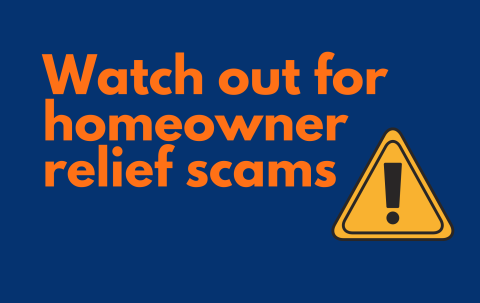As many states including Vermont begin to award millions in financial assistance to homeowners impacted by the pandemic, the U.S. Department of Housing and Urban Development (HUD) has issued warnings of predatory fraud schemes targeting desperate homeowners looking to avoid foreclosure and stay in their homes.

Vermont homeowners who have suffered a financial loss due to COVID-19 are eligible for relief through two main channels: loan modification offered through a mortgage servicer, and one-time grants for past-due expenses including mortgage payments, utilities, property taxes and property association fees offered through Vermont Housing Finance Agency (VHFA)’s Homeowner Assistance Program (HAP). VHFA has produced an informational video discussing the differences between these resources.
Unfortunately, both programs may be targets of scammers trying to exploit homeowners. The scammers may claim that they are housing counselors, lawyers or government representatives who will handle all the details of a deal with the mortgage lender or the HAP application but will instead charge unfair fees or steal your home payments.
Here are some tips to avoid falling victim to these schemes:
1. Use caution when accepting offers of financial assistance.
Only VHFA can approve you for a HAP grant, and no one other than your mortgage lender can agree to make modifications to your loan. If an offer for assistance from a third party seems too good to be true, it likely isn’t real.
2. Don’t pay upfront fees.
Applying for HAP is free, and homeowners can apply on their own online. If you need help applying, you should contact one of our local affiliated organizations, who will help you for free. Homeowners should be wary of anyone charging a fee to apply.
While mortgage refinancing or other loan modification programs may have fees associated with them, it is illegal to request upfront fees for mortgage assistance.
Scammers may also encourage you to pay for a forensic audit or pay to participate in a lawsuit against a lender to force a modification to your loan. Neither is necessary to allow you to modify your loan or receive HAP funding.
3. Don’t stop making payments without speaking directly to your mortgage lender or service provider.
VHFA encourages you to stay in touch with your mortgage lender and service providers throughout the HAP application process and to keep making payments to them if you are able. Scammers may try to get homeowners to pay them directly and discourage homeowners from speaking to their lender or service provider.
4. Don’t sign any documents giving up the title to your home.
Your property title is proof that you own your home. Scammers may try to convince you to surrender the title or deed to your home as part of a deal that will let you stay as a renter and eventually buy the home back. There is no legitimate program that offers this arrangement. Carefully review any documents you are asked to sign.
5. Protect your personal information.
Do not give your personal financial information, including your bank account number, Social Security number, or the name of your loan servicer to an unrecognized caller, someone knocking on your door or in response to an unexpected piece of mail.
If you aren’t sure whether an email or a call is from VHFA, you should call our hotline directly at (833) 221-4208.
6. Speak with a HUD-approved counselor for free.
HUD-certified counselors are available to provide free counseling to help you evaluate your options. They can confirm whether an offer of assistance is legitimate.
If you believe that you have been the target of a scam, you should contact HUD’s Office of Inspector General (OIG) at 1-800-347-3735 or call the Vermont Attorney General’s Consumer Assistance hotline at (800) 649-2424.
The VT Homeowner Assistance Program is being supported, in whole or in part, by federal award number HAFP-0040 awarded to the State of Vermont by the US Department of the Treasury.

